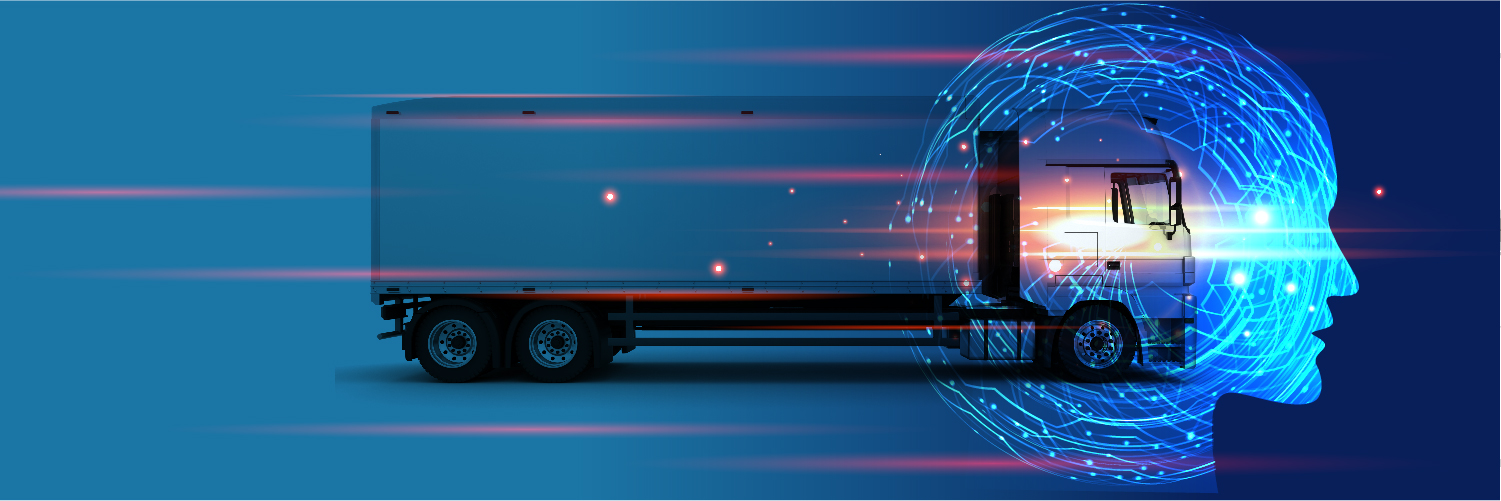From facial recognition to virtual banking, it is likely that artificial intelligence (AI) has touched your life in some capacity. Many organizations worldwide are seeing the benefits of AI technology and reaping the rewards.
For example, fleet managers are using AI-based technologies to oversee their operations. The right AI-powered fleet management platform offers accuracy, accessibility, and speed. For commercial transport, AI assists fleet managers with monitoring their vehicles and drivers, making the movement of people and goods safer, quicker, and more efficient.
In a constantly evolving world, AI simplifies fleet operations and improves best practices by gradually eliminating human error. In this post, we’ll examine how AI fleet management can shape the future of transportation.

How AI Integrates with Fleet Management
AI-integrated software is a complex system of devices and applications. Examples include the Internet of Things (IoT), predictive data analysis, machine-learning platforms, HD cameras and sensor displays, communication and display systems, and WiFi.
Before we discuss how each part contributes towards a powerful fleet management engine, it is essential to know what each example is and what it does.
Internet of Things
The Internet of Things (IoT) refers to the network of sensors and actuators that constantly collect data from their surroundings.
IoT for fleet management functions using three primary technologies:
- Wireless communication tools (4G, Bluetooth, WiFi) transmit pertinent information
- Global Positioning Systems (GPS) track locations in real-time and with precision
- OBD Diagnostics (such as OBDII and J1939) scanners can self-diagnose and provide detailed reporting
For the management of fleets, IoT ensures that enough data is gathered to be analyzed while also promoting the seamless sharing of information among all parties involved in the supply chain, including manufacturers and retailers.
Machine Learning
Machine learning technology lets fleets learn from the information collected over time and then make adjustments based upon that information.
The result is the development of intelligent systems where AI can develop decision-making capabilities that allow for more efficient management of real-time situations.
HD Cameras
Cameras provide recorded video content that can be analyzed and accessible on-demand, allowing for a more thorough study of drivers’ behaviour, road conditions and risks.
An AI system that has all the above elements is well equipped to perform any number of relevant tasks, including:
- Tracking precise traffic data and transmitting them to various devices
- Transmitting information to every part of the supply chain
- Real-time analysis of data and providing the driver with optimal routes
- The ability to detect impaired, drowsy or distracted driving behaviour
- Providing video footage that captures the full extent of accidents from various vehicle angles
- Self-diagnostics and solutions using predictive maintenance
In all cases, the result is safer drivers, cost-efficient vehicles and an efficient fleet.

How AI Optimizes Fleet Management Platforms
Reduced Downtime for Vehicles
Developments in data analysis, the internet of things (IoT) and predictive maintenance are revolutionizing the process of vehicle repairs.
AI provides precise self-diagnostics and solutions for fleets. A vehicle equipped with an engine diagnostics system helps you anticipate problems before they occur, which in turn reduces downtime and ensures that your drivers stay safe on the road.
Increased Safety of Drivers and Vehicles
Artificial intelligence systems can be trained to identify several driving behaviours, such as yawning, drowsy eyes, distractions, cell phone use, and other indications of unsafe activity.
When any unwanted behaviour is detected, an alert signals the driver and the fleet manager simultaneously, giving the driver an opportunity to self-correct and allowing the fleet manager to coach in real-time.
Having an AI-based system in your vehicles is akin to a coach in the cab, keeping your driver, vehicle, and assets safe.
Real-time Fleet Analytics
AI systems collect information based on road conditions, traffic information, real-time weather, and environmental dangers to help with predictive analytics.
This insight-driven data helps fleet managers select the most efficient routes, schedule prescriptive maintenance and enhance the overall efficiency of business operations.
Security Solutions
Security and surveillance are important aspects to consider when operating a fleet. Regardless of the size of your fleet, an AI-powered system offers an array of options for more secure outcomes.
For example, AI facial recognition technology can verify your drivers to prevent vehicle misuse, and AI dashcams can record security footage to prevent theft or vandalism to vehicles.
How AI Fleet Management Will Transform the Future of Transportation
The automotive industry endures several efficiency gaps that, if left untreated, can negatively impact fleet operations and profits.
AI can potentially solve these issues and bolster the future of transportation by improving the following:
- The prioritization of resources and their effectiveness
- Unsafe driving habits that can result in accidents
- Road risks
- Data analysis and collection
- Compliance
Final Thoughts
The future of transportation is brighter than ever, thanks to the possibilities of AI in fleet management. Unpredictable road conditions, operational expenses, and issues with driver retention could soon be obsolete when fleets decide to make the transition. In short, everyone wins.
Reach out to your Zenduit consultant today and ask about how our artificial intelligence fleet management systems can work for you.







































